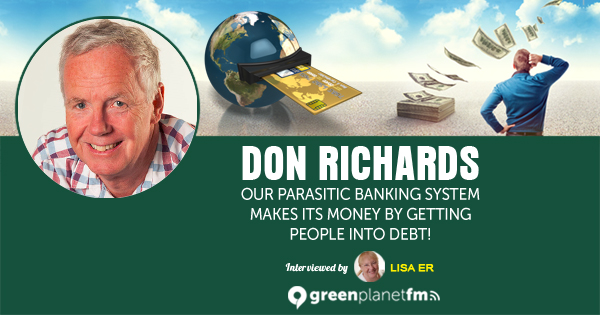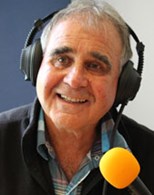
Each time a bank makes a loan, it essentially creates money as debt.
This system results in problems such as increasing levels of household debt and inflating property prices.
It ensures a rapidly widening income gap.
In New Zealand we are allowing our children to go into debt slavery!
First they have student loans; then they may have a mortgage, and then they are expected to save for their retirement.
If we continue with this system we will fail as a society.
In this interview Don Richards, co- founder of Positive Money New Zealand, talks with Lisa Er about the problems and the solutions.
Positive Money New Zealand began when Sue Hamill and Don Richards had the current debt based system explained to them in 2010, while watching, “ Money as Debt”. When they learnt that New Zealand operated under the same system - they customised the UK campaign to the New Zealand
situation.
Don explains how new money is introduced into the economy by private banks as loans and is shown by water coming though the tap.
As they create the money themselves, the only constraint is people’s ability to take on higher and higher levels of debt. This created money distorts the
property market and allows house prices to increase year in and year out, irrespective of demand.
Banks make enormous profits from money creation – more than $5,000 million dollars each year - $10 million dollars a day and most of that money disappears
overseas. Imagine what we could do with $10 million dollars a day. It is a huge drain on our economy.
There is however a bigger problem. When people repay their loans, that money disappears from the economy, which is represented by money going down the
drain.
Loan money that is repaid to the banks cannot then be lent out again because as the original loan money was created from nothing it must return to nothing.
In banking terms money is “destroyed” when people repay loans. This is ridiculous and is probably what the former governor of the Bank of England, Sir
Mervyn King, was alluding to when he said “Of all the many ways of organising banking, the worst is the one we have today”.
For our economy to work, more people must get into debt than get out of debt.
In times of recession, people take out fewer loans as confidence in the future declines, and more people repay their loans. The banks also get nervous
as their confidence in people’s ability to repay loans diminishes and they lend out less money.
Governments make matters worse by introducing austerity measures, cutting back on their spending. This further reduces the amount of money in the economy,
prolonging any recession.
When confidence picks up, people take on new loans faster than the old ones are repaid, banks become bolder and lend more and the government spends more,
creating a boom. This is the boom and bust cycle which is an artificial construct based on a flawed monetary system.
The Positive Money solution would have the Reserve Bank issue our money supply debt free and they would take control of the tap.
The money being introduced into the economy by the Reserve bank could be spent by the government on infrastructure projects such as hospitals, roads and
bridges or new schools and the need to government debt would disappear.
Our government debt is currently $110, thousand million dollars and the Government pays Five Thousand Million Dollars in interest alone each year. This
equates to 14 Million dollars a day that it does not need to spend.
When you add the principle repayments that do not need to be made, the amount of available money is staggering. Imagine what we could do with all of that
extra money.
There would still be a place for private banks though. While they could no longer create money from nothing, they would have to attract deposits from those
willing to invest.
In this way loans from the private banks, once repaid would be available to be lent out again, thereby putting a plug in the bath.
The boom and bust cycles would smooth out and the available money in the economy would rise.
With more money in circulation New Zealand would move from a low wage economy to a high wage one.
Governments from the left could use the additional money to increase social services and provide a Universal Basic Income or pay off the student loan debt.
Governments on the right could use it to pay down the Government debt and reduce taxes.
We would no longer need to engage in risky offshore drilling or engage in fracking, or mining in our conservation estate to grow our economy – it would
grow organically. There would be money for free education, proper schools, affordable health care, a decent retirement income…
The International Monetary Fund paper that was mentioned in the Seven Sharp clip endorses a similar solution. Here is a quote straight from the paper:
the benefits would be: dramatically reduced public and private (net) debt levels (because money creation no longer requires simultaneous debt creation),
better control of business cycle fluctuations, complete elimination of bank runs, output gains of 10% and inflation can drop to zero without posing
problems for the conduct of monetary policy.
Not only would the New Zealand economy thrive, individuals and families that are struggling to make ends meet under the current system would prosper.
Positive Money New Zealand is a campaign to move New Zealand from a debt-based economy to one that operates with a full reserve in which money has been
issued debt-free and interest-free.
This will free the nation and its people from the crippling effects of ever increasing interest bills - that keep the majority of people on the debt treadmill.
The campaign is based on one that has been running in the UK called Positive Money - which started in May 2010 as well as a similar one in the United States
called the American Monetary Institute - which began in 1996.
Positive Money New Zealand is now part of a global network of organisations dedicated to reforming our banking system.
Don lives in Whakatane and is married to Sue Hamill - the co founder of Positive Money New Zealand. He has two daughters from a previous marriage and became
a grandfather in May 2011.
Don has worked in a number of key industries during times of significant change in New Zealand’s recent history. He was employed by BP Oil New Zealand,
working in their Retail Strategy unit during the deregulation of the New Zealand oil industry in the late 1980's.
He also worked for Standards New Zealand in the late 1990's as it grappled with the transition from state funding to the user-pays model. In addition,
Don worked for the New Zealand Dairy Board, leading up to the formation of Fonterra and beyond. Don then worked for BRANZ (Building Research Association
of New Zealand) for 11 years as their Quality and Environmental Manager prior to moving to the Bay of Plenty.
He now works as a Director for Simple, Effective Solutions that offers consultancy services for Health and Safety, Environmental and Quality Management
systems.
Don has also taken on a number of community based projects including organising clean ups of Wellington harbour which started in 1997 and continues to
this day. In 1999 he was awarded the title of Conservationist of the year for his efforts. In addition, he organised street parties for his neighbours
and ran a campaign to stop whaling in the southern ocean - called Friends of Tangaroa.
Links mentioned in the interview:
Bryan Gould article in The Herald.
This interview was sponsored by The Awareness Party.
